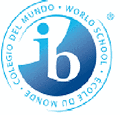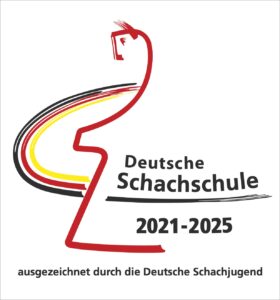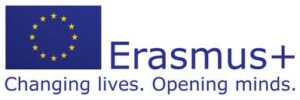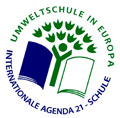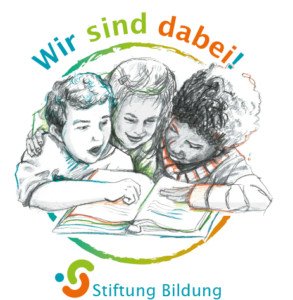Erasmus Projekt 2019 - 2022
ERASMUS Projekt 2019-2022

Nach erfolgreichem Abschluss des zweijährigen Projektes „4 Cs 4 the 21st Century – Curiosity, Cooperation, Communication, Creativity“ (2017 – 2019) können wir mit alten und neuen Partnern direkt an einem weiteren internationalen Projekt mitarbeiten – leider aufgrund der Corona Pandemie seit 2020 zunächst rein virtuell!
Drops of Awareness – Water matters!
ERASMUS+ Projekt 2019-2022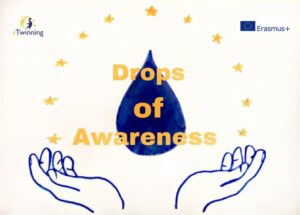
Wir freuen uns auf die weitere Zusammenarbeit mit altbekannten und neuen Partnerschulen aus Pärnu, Bologna, Martinique, Haarlem und Madrid. Nach erfolgreicher Antragstellung durch das internationale ERASMUS+ Team werden auch in den nächsten drei Jahren zahlreiche Schülerinnen und Schüler der teilnehmenden Schulen an ihren Schulen vor Ort, gemeinsam im virtuellen Twinspace, der Online-Plattform des Projektes, und bei internationalen Projekttreffen an Projekten rund um das Thema Wasser arbeiten.
Dies sind unsere geplanten Themen:
- The Beauty of Water (Introduction) // Shades of Blue (Salt Water)
- Flowing Waters and Lakes (Sweet Water) // Treasure of Mankind (Drinking Water)
- Invisible Water Wastage (Virtual Water)// Water in the Future (Our Vision of Water)
Ansprechpartnerin für das ERASMUS+ – Team an der Schillerschule: Stefanie Lücking (E-Mail)
Unsere Partnerschulen:
Aus dem Projekt:
Tere Eesti
Dieses Jahr ging es für 16 SchülerInnen aus dem 10. Jahrgang vom 15. – 22. April 2023 nach Estland. Diese Reise hat uns Erasmus+ ermöglicht. Unsere ganze Reise stand unter dem Motto „Wasser“. Dabei haben wir nicht nur das Thema Wasser vertieft sondern auch die estnische Kultur kennengelernt.
Unser Trip hat am Hannover Flughafen begonnen. Von da aus sind wir nach Riga geflogen, Hauptstadt von Lettland, und haben dort eine Nacht verbracht. Am nächsten Morgen sind wir mit dem Bus nach Pärnu (unserem Reiseziel) gefahren. Während der Busfahrt waren wir alle schon sehr aufgeregt, endlich unsere Austauschpartner kennenzulernen. Den restlichen Tag hatten wir Zeit um uns in der Familie einzuleben. Von da an hatten wir sechs wunderschöne Tage an der Küste von Estland.
Da Wasser unser Thema war, haben wir uns auf unseren Exkursionen viel mit dem Thema beschäftigt, aber auch die Natur stand im Fokus. Wir haben zum allersten Mal ein Windrad von innen besichtigt. Dabei haben wir viel über erneuerbare Energien gelernt und wie wichtig sie für unseren Planeten sind. Wir durften unserem Guide, der auch da gearbeitet hat, viele Fragen stellen.
Auch der Besuch eines Science Centers war sehr aufschlussreich. Dort haben wir viel über Estlands beeindruckende Wildnis gelernt. Der Center ist vor allem für Kinder gedacht, um spielerisch mehr über die Natur zu erfahren. Der Boden war mit kleinen Kieselsteinen gepflastert weshalb es eine schöne Fußmassage gratis dazu gab.
Außerdem haben wir ein Moor besichtigt, welches das zweitgrößte in ganz Estland ist. Über das Moor sind wir auf einem kleinen Holzweg 3 Stunden gewandert und eine Lehrerin hat uns über die Besonderheiten eines Moores aufgeklärt.
Wir haben auch eine kleine mittelalterliche Insel besucht. Dort hat uns ein Einheimischer in dem hiesigen Museum herumgeführt. Unser Guide war sehr humorvoll und hat viele Späße mit uns gemacht.
Auf all unseren Fahrten hat uns unser Busfahrer begleitet. Dieser hat uns auch stets ein warmes Mittagessen gekocht, das zu unser Überraschung sehr lecker war.
Außerhalb der Exkursionen hatten wir viel Freizeit, in der wir viele verschiedene Aktivitäten mit unseren Gastfamilien gemacht haben. Wir waren Bowlen, bei einem Basketballspiel, shoppen, am Strand, picknicken oder Pizza essen. In Estland haben wir auch unsere neue Lieblingssüßigkeit
entdeckt. Kohuke hat uns jeden Tag den Tag versüßt.
Wir haben in unseren Gastfamilien viel über die, für uns manchmal eigenartig wirkenden, Verhaltensweisen der Esten gelernt. Auffällig war, dass die Esten eher verschlossen waren und die meisten nicht an Smalltalk interessiert waren. Es war eine Herausforderung mit manchen SchülerInnen aber auch Eltern warm zu werden, was uns aber am Ende geglückt ist.
An unserem letzten Tag haben wir mit unseren AustauschpartnerInnen zusammen gekocht und viele Spiele gespielt. Das war ein toller Abschluss nach unserer unvergesslichen Woche. Die estnischen LehrerInnen haben uns noch mehrere estnische Volkstänze beigebracht, bei denen wir maßlos gescheitert sind. Am frühen Abend haben wir uns von den LehrerInnen verabschiedet und noch „Capture the Flag“ gespielt. Danach haben wir den Abend am Strand beim Sonnenuntergang ausklingen lassen und unsere eigene kleine Party veranstaltet. Wir hatten sehr viel Spaß die Partyverhaltensweisen der EstInnen kennenzulernen und wir hatten eine unvergessliche Zeit.
Wir haben die Reise in vollen Zügen genossen und viele einmalige Erfahrungen gesammelt. Wir sind zum einem mit den EstInnen, aber ganz besonders mit den Deutschen zusammengewachsen.
Wir sind Erasmus unglaublich dankbar diese Chance, ein neues Land zu erkunden, bekommen zu haben.
Sophia und Clara 10a
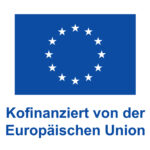
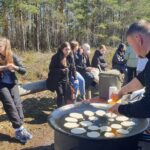
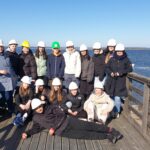
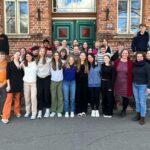
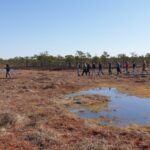
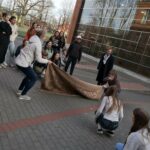
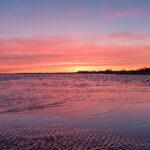
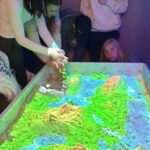
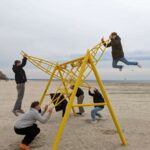
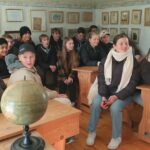
Auszeichnung für „Drops of Awareness“
Urkunde Success story Drops of AwarenessErfolgreiche europäische Zusammenarbeit von Schulen im Erasmus-Programm wird auf einer Tagung in Berlin sichtbar: Insgesamt 36 Projekte wurden prämiert.
Mit dem Erasmus-Programm profitieren Schulen und Kitas von europäischem Austausch. Wie dies in der Praxis umgesetzt wird, zeigen die Projekte, die die Präsidentin der Kultusministerkonferenz und Berliner Senatorin für Bildung, Jugend und Familie, Katharina Günther-Wünsch, heute auf einer Fachtagung des Pädagogischen Austauschdienstes (PAD) in Berlin ausgezeichnet hat. „Die Vielfalt macht deutlich: Erasmus+ ist das Programm für alle im Schulbereich, die sich über Themen wie Inklusion, digitale Bildung, demokratische Teilhabe, Nachhaltigkeit und Mehrsprachigkeit austauschen und von den Erfahrungen anderer in Europa lernen wollen“, würdigte Katharina Günther-Wünsch die Preisträger.
Die Tagung unter dem Motto „Best of Erasmus: Wie internationaler Austausch zu Schulqualität beiträgt“ mit rund 150 teilnehmenden Lehrkräften und Bildungsfachleuten bot den feierlichen Rahmen für die Anerkennung der prämierten Projekte.
Success Stories“ aus Mobilitäts- und Partnerschaftsprojekten Inklusion, Nachhaltigkeit, Digitaler Austausch und Partizipation & Teilhabe: 22 Schulen mit Projekten zu den vier Prioritäten des Erasmus-Programms werden 2023 von der Nationalen Agentur als „Success Stories“ ausgezeichnet. Kriterien dafür sind unter anderem Innovation, Nachhaltigkeit, Wirkung und Übertragbarkeit sowie bildungspolitische Relevanz. In dieser Kategorie wurde auch die Schillerschule mit unserem Projekt „Drops of Awareness“ ausgezeichnet!
Quelle: https://erasmusplus.schule/news/das-beste-aus-erasmus-auszeichnungen-verliehen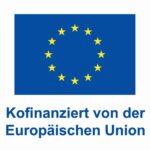
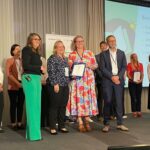

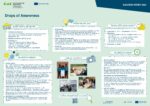
Erasmus trip to Spain
– Canoeing, visiting Madrid and water museums –
All of that and way more aspects made our stay to Spain unforgettable. 13 students of the 10th grade had the chance to benefit from the experience of living in a host family and exploring Spain for about five days. Due to the focus of the exchange, we did many activities all around water but also had a lot of fun getting to know Spain and its culture.
During our stay we experienced the life in host families and in general the everyday life of our new friends. For example, we went to the so called “centro” where we spent almost every evening eating dinner with our partners and where we tried many different Spanish snacks.
Every day, we did diverse activities like getting to know the school, canoeing, visiting a water museum in Madrid or doing a scavenger hunt in Nuevo Baztán. Because of the topic of this trip, “Erasmus Water”, our Spanish partners and us worked on different presentations all about water problems in general and in Spain.Apart from the school activities, we had a lot of fun in the afternoons. Not only did we try a lot of different food options, we also went to many football games of our friends or played football ourselves. Also, we went on walks on beautiful streets, went shopping in Madrid and even got to know the Spanish trains and busses ;-). That’s not to say that the school activities weren’t fun though! On our bus journeys, we sang a lot of Spanish and German songs and totally enjoyed spending time together. Even though we spend most of the day outside, we always returned to our host families, who cooked typical Spanish food for us and were always very welcoming and friendly.
The last day was, also because of some complications due to the cancellation of our flight, very eventful but very sad for all of us. But despite all tears and goodbyes every single one of us was very thankful for this experience and for getting to know our new friends!
And hopefully we will see each other again very soon!P.S.: not to forget our mascot Pablito who traveled everywhere with us :-)) Lotta and Alisa
¡Hola amigos!
What comes to your mind when thinking about Spanish culture? Bullfights, Flamenco and Tapas? Well, you’re not wrong but there is more hiding behind these stereotypes. In terms of our Erasmus project „Future of Water“, we visited Eurovillas, a suburban part of Madrid. And we’re happy to report our observations of the cultural differences to you.
First things first: the greeting at the airport. As soon we arrived, we’ve been pulled into a warm hug followed by kisses on the cheek. But the surprises didn’t stop there. If you enter a house, what’s the first thing you do? Take off your shoes, right? But not here! Our host parents were seriously worried about us getting cold feet. And that in a hot country like Spain! Anyway, when they showed us around the house – or should we rather say mansions – the enormous pool, which almost all the host families owned due to the high temperatures in summer, stood out to us as well as the amount of pets. Especially adopted street cats.
After a long day full of new experiences it was about 10 p.m. …and time for dinner. Finally, cause we – not used to such a late dinner – were almost starving. Having dinner together is a very central custom in Spain. Either with our host families, for example while watching TV, or with other students of the Erasmus group at a local diner. And what’s a natural consequence of a group setting? Sharing of course! So it’s common for everyone to have a taste from the same plate, often filled with fried meat and fish, sometimes outnumbering the vegetarian foods.
All in all, they were very welcoming as well as open-minded in general and invited us for a future visit. This hospitality appears to be a characteristic part of Spanish culture.
So? What comes to your mind now when you think of Spain? We hope to have successfully given you a more colorful picture. But to see the full spectrum of colors you have to go there by yourself! ¡Viva España! <3
By Leona and Lara
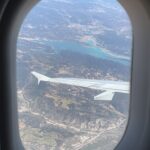
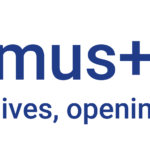
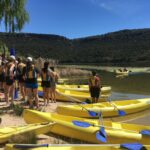
Our trip to Haarlem
During springtime we were offered to visit Haarlem for one week with the Erasmus+ project. In our Erasmus+ profile class with the topic “Drops of awareness”, we were tasked to film a documentary reporting about water in our region.
At the Mendelcollege in Haarlem each of the five countries presented their very own documentary. Every country has individual problems with water and they are quite dramatic. It was really interesting to learn about the situations in each country. After that we formed international groups and tried to come up with solutions for the problems.
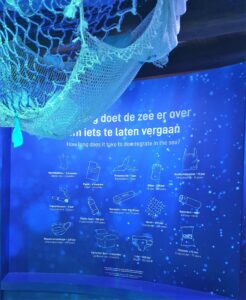 Since we were in the Netherlands we learned about the importance of water there, e.g. regarding historical events, like the Great Flood of 1953 which caused several hundred deaths due to broken dykes and which initiated the building of world’s largest storm barrier Deltaworks which we visited, as well as present ones.
Since we were in the Netherlands we learned about the importance of water there, e.g. regarding historical events, like the Great Flood of 1953 which caused several hundred deaths due to broken dykes and which initiated the building of world’s largest storm barrier Deltaworks which we visited, as well as present ones. Of course, we also visited Amsterdam and went into the Scheepvart Museum that showed the early phases of the discovery of our planet.
Of course, we also visited Amsterdam and went into the Scheepvart Museum that showed the early phases of the discovery of our planet.We were able to meet lots of new people and to form friendships which will last longer than just this one week. The Erasmus+ project offered us a lot of new experiences that widened our view of water and how we must stay proactive to save our water. We learned the importance of water for the world, which only strengthens the fact that we have to raise awareness of these problems.
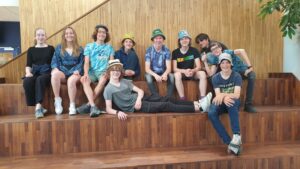
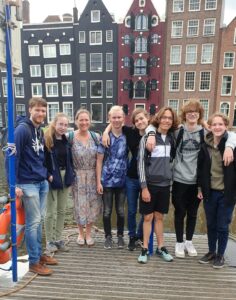
Hanno L. 10d
Internationales Dokumentarvideo
https://youtu.be/OK0a5WrewWA
Erasmus+: Drops of Awareness and the Future of Water
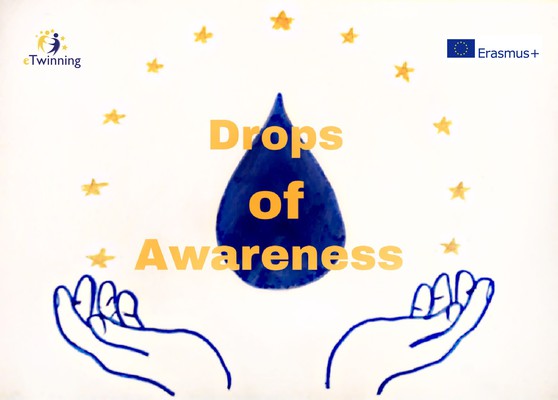
Liebe Schulgemeinschaft,
lange ist es her, dass wir mit Schüler*innen wegfahren durften und im Fall von Erasmus+ hat während unseres laufenden Projektes „Drops of Awareness“ leider noch keine einzige reale Schüler*innenbegegnung stattgefunden. Dennoch haben sich unsere Schüler*innen großartig in zwei virtuellen, internationalen Projekten, organisiert durch unsere Partnerschulen in Estland und Spanien, engagiert. Nun ist endlich die Zeit gekommen die Koffer zu entstauben, da wir mit insgesamt 12 Schüler*innen aus drei Jahrgängen an zwei Projektbegegnungen an unseren Partnerschulen in Haarlem, Niederlande, und in Le François, Frankreich, teilnehmen werden.
Aber auch die Aussichten auf das nächste Schuljahr sind sehr gut, da wir einen Projektantrag zum Thema „The Future of Water“ für ein Jahr und die Möglichkeit mit insgesamt 26 Schüler*innen zu unseren Partnerschulen in Eurovillas, Spanien, und Pärnu, Estland, zu fahren von Erasmus+ bewilligt bekommen haben!
Wir freuen uns darauf Europa mit euch zu erkunden!
Euer Erasmus+-Team
Virtual Erasmus+ student meeting
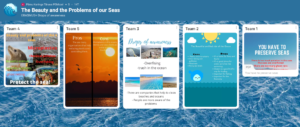
Padlets for our international collaboartion 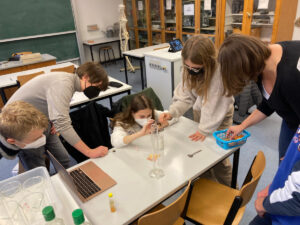
Experiment on water 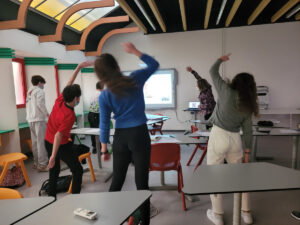
Moving break in Bologna! 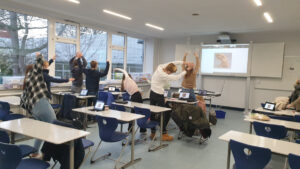
Moving break in Hannover! 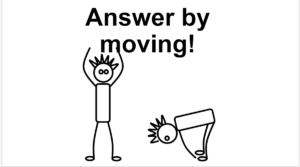
Tere! That means “hello” in Estonian.
This is one of the many things we learned during the project hosted by our Estonian partner school from 29th November to 1st December, 2021. We got to know many new things about Estonia, their biodiversity and the Baltic Sea as Estonia borders it. In order to learn many interesting facts, we had two professors visiting the video conference to give a presentation.
But not only the professors made a presentation, students from all countries too. Also, the students of each country worked together on a poster, which was presented later on. The Estonian lesson, in which we learned the basic phrases of the Estonian language, and the interactive quizzes were very interesting and liked by everyone.
On the last day, we also did some cool experiments regarding water and their surface tension. We particularly liked the movement breaks between the lessons. These were used to refresh our mind, so we could concentrate better.
All in all, we really enjoyed these three days, I think everybody can agree with that and we also made a few new friends along the way. We really hope the next time we meet, will be in person. Have a great day!
Ben, Jonas, Justus, Leni and Oliver
(Schillerschule year 8, Hanover, Germany)Here you can see the article:
Article Hanover Estonian mobility_Winter2021
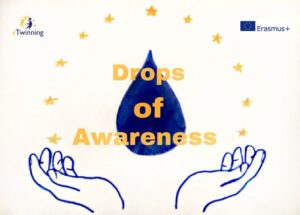
Winners of the Erasmus+ photo competition 2021 (Schillerschule)
The Erasmus+ „Drops of Awareness“ team proudly presents the winners of the lakes and rivers photo competition 2020/21:
All handed in photos showed the amazing beauty of Europe – thanks for taking us on a journey when travelling was impossible!
Over all 86 students chose their three favourite pictures – thanks for taking part in the poll!Congratulations to our three winners Annika, Leona and Gustav!
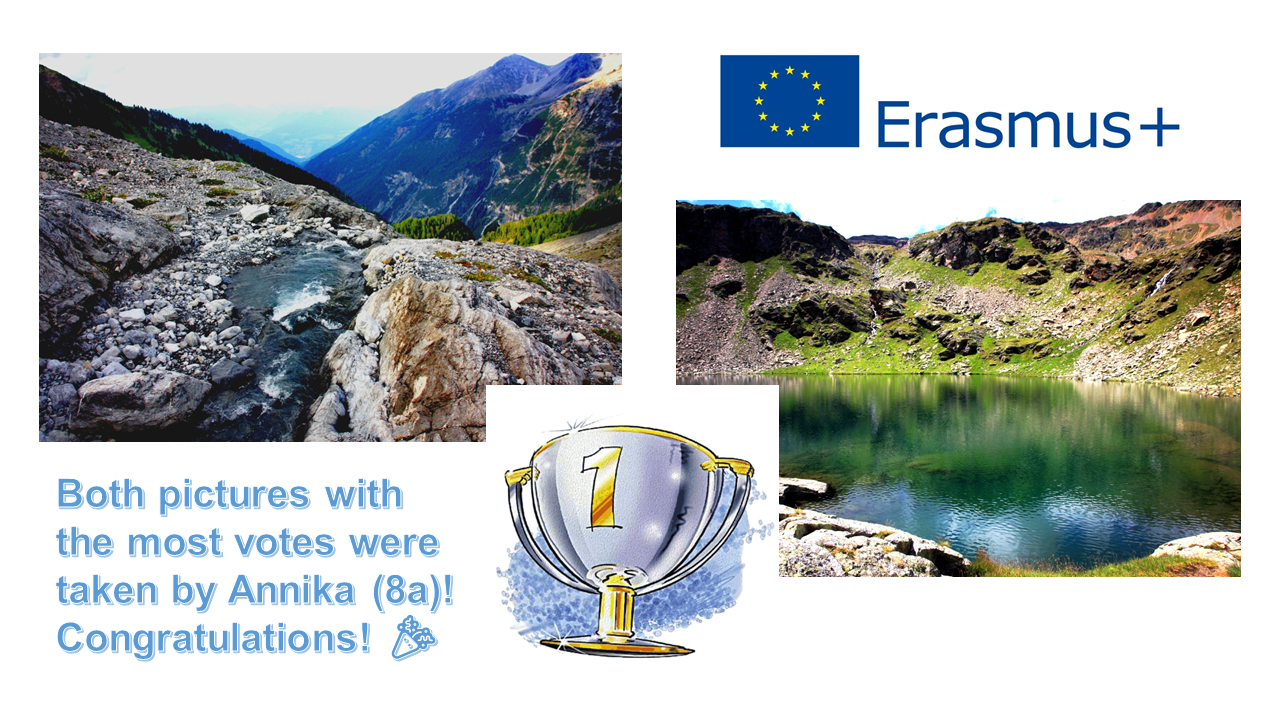
„Lakes and Rivers“ photo competition 2020/21 
„Lakes and Rivers“ photo competition 2020/21 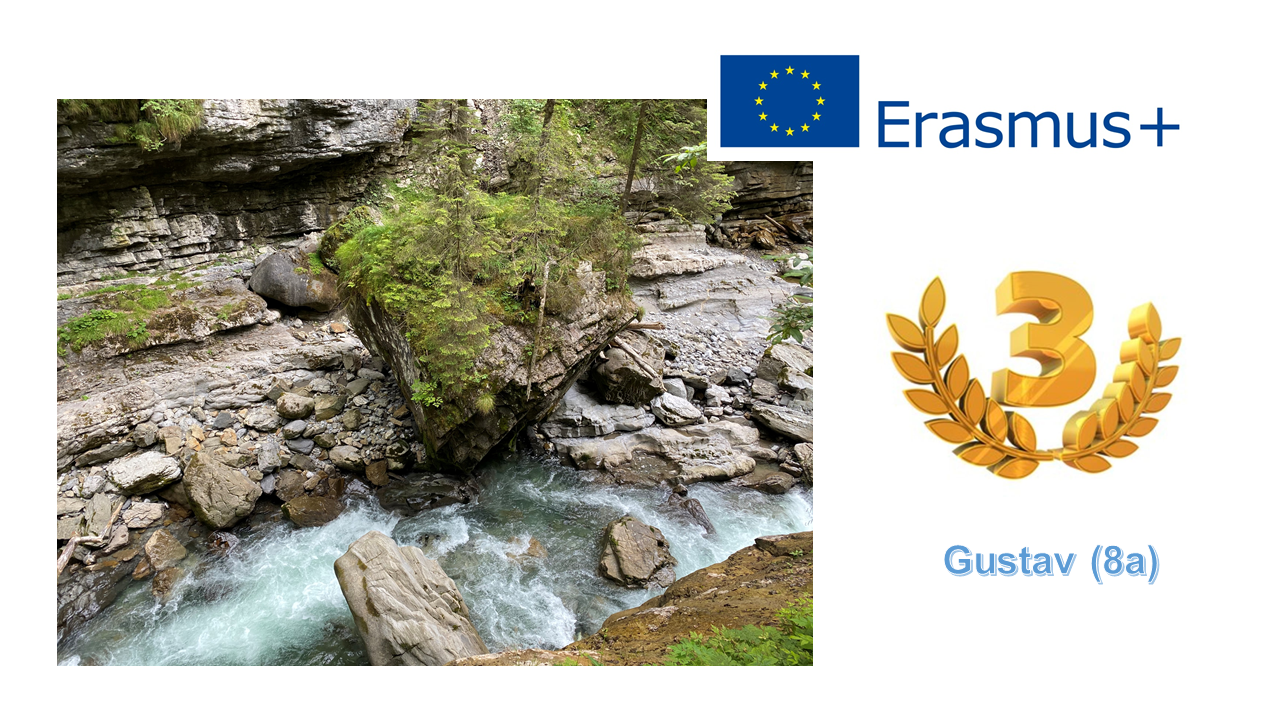
„Lakes and Rivers“ photo competition 2020/21 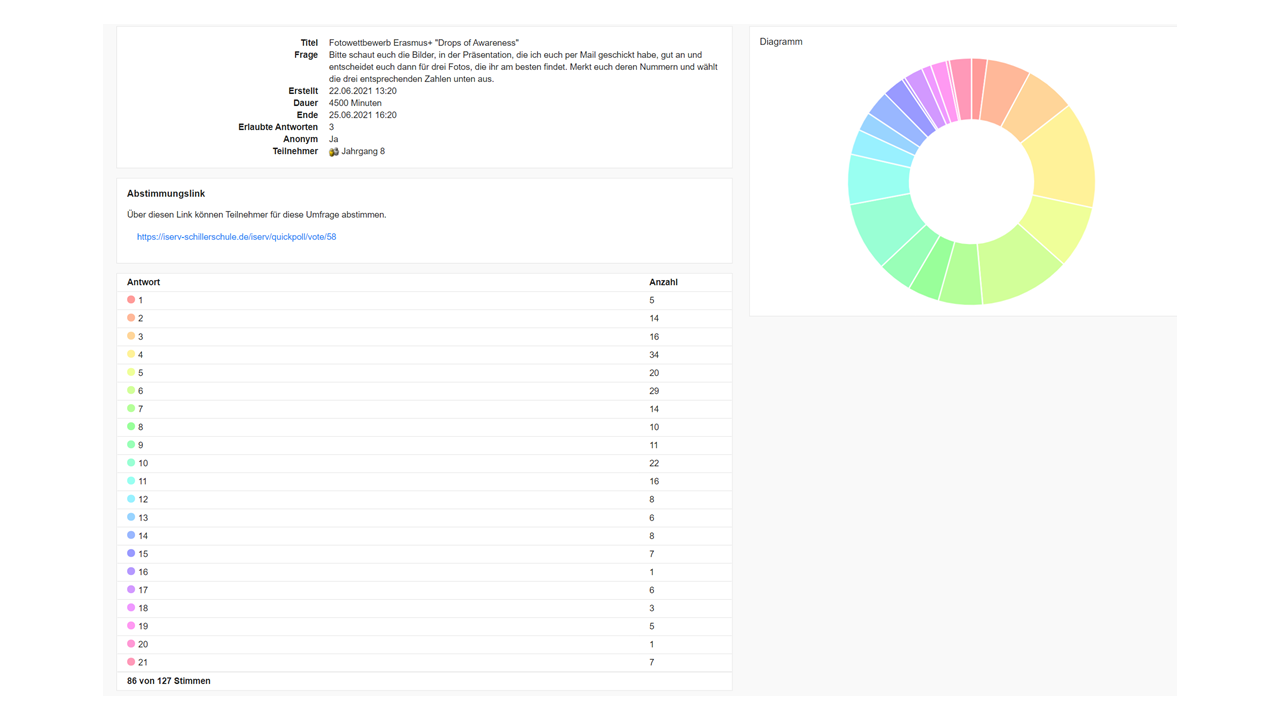
„Lakes and Rivers“ photo competition 2020/21 Stefanie Lücking for the Erasmus+team (27 June, 2021)
„Clean up the world – Day“ – Ein Beitrag des Erasmus+-Projekts „Drops of Awareness“
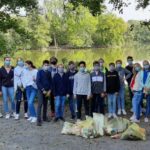
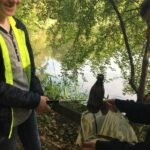
Am 23. September 2020 hat unser PU-Kurs „Erasmus+: Wasser“ zusammen eine kleine Aktion gestartet. Wir sind zu den nahegelegenen Annateichen gelaufen, um der Umwelt etwas Gutes zu tun, indem wir Müll gesammelt haben. Zwischen dem ganzen Papier und Plastikmüll wurden sogar Dinge wie teure Weinflaschen oder ein silberner Ring gefunden. Oder auch etwas absurdere Sachen wie Socken und ein Mini-Grill. Insgesamt war es eine erfolgreiche Aktion!
Mia & Leana, Jg.8, PU-Kurs “Erasmus+: Wasser“
Help the world to become a better place!
In our PU lesson, we went to a lake to do something good for the environment. Even though the lake seemed to be very clean and we really couldn’t see any rubbish at all, we still collected almost eight bags of the size of a six-year-old full of plastic, bottles and other very animal- and environment-harming things. Do you know, how many animals we prevented from getting harmed for no reason at all? Do you even have a clue, how much eight bags full of trash are? Then let us tell you – it’s a lot.
After the successful project, we all felt very proud of ourselves for helping the world to be a better place.
Kilian, Salina and Simon, year 8, “Erasmus+: Water“-project
Europe is dead? NOT AT ALL

Although unfortunately our planned international meeting in Pärnu, Estonia, had to be postponed due to the Covid-19-lockdown of all of the participating countries, this does not mean that all Erasmus+ activities have been cancelled as well.
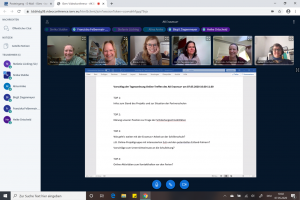
Naturally, most of our partner countries, as Schillerschule as well, first had to organise homeschooling for regular lessons. This has been pretty hard, as there have been severe restrictions to everybody’s lives especially in Italy and Spain. However, after some weeks of getting used to the “new normality” and an upward trend in all countries, planning about Erasmus+ in times of Covid-19 has started. Hence, some members of Schillerschule’s Erasmus+ team had a video conference on May 7th to discuss plans for the near and far future and to exchange ideas about how to carry on.
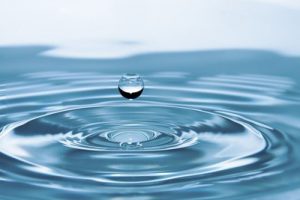 Meanwhile, Mr Fischer, our very own eTwinning expert, started a new eTwinning project about “The story of a water drop” in which the international team pursues the question “What kind of story a drop of water would tell us if it could speak”. The idea of this project is to allow different students from different age groups to share their knowledge about water, and what water means to the different peoples of Europe. “Bon voyage!” Mr Fischer!
Meanwhile, Mr Fischer, our very own eTwinning expert, started a new eTwinning project about “The story of a water drop” in which the international team pursues the question “What kind of story a drop of water would tell us if it could speak”. The idea of this project is to allow different students from different age groups to share their knowledge about water, and what water means to the different peoples of Europe. “Bon voyage!” Mr Fischer!https://youtu.be/cMn9SKaIpsQ
Internationally, the Spanish Erasmus+ coordinator Mrs Ruiz García in Eurovillas is making a video for Europe Day 2020, which will be on May 9th and asked the partner schools to send some video messages to her students. Fortunately, our students, who had been supposed to go to Estonia,
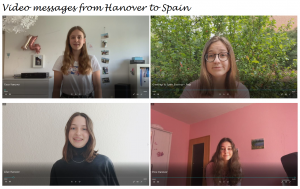 happily embraced this idea and recorded cheerful and outgoing videos to our partner school. Thank your very much for this commitment, girls!
happily embraced this idea and recorded cheerful and outgoing videos to our partner school. Thank your very much for this commitment, girls!Well, what’s next? Although we cannot travel to our partner schools in person at the moment, we are just planning another way to go there – come back soon to accompany us on our virtual journeys to all those fascinating and beautiful places!
Stefanie Lücking for the Erasmus+team (May 2020)
PU-Tag Jg.8: Erasmus+-Kurs auf dem Wasserlehrpfad Grasdorf /
Our trip to the Enercity „Trinkwasser-Erlebnispfad“ Grasdorf


On 7th November 2019 we went to the Enercity drinking water path in Grasdorf near Laatzen. It was a really nice day but a bit wet, too. We met at school at 8 o’clock and then we went to the tram to get to the drinking-water path. We looked at the map of the stations planning which way to take and a few minutes later we started to explore the path in groups of three. There were different stations on the way with different topics. On each station there was a QR-Code which we could scan to read the information about the stations. We learned a lot about the production of our drinking-water in Hanover. Now we can be sure that our water is definitely clean and tasty too.
We had a great day there!
Gesa, Charlotte and Julia
Wir starten mit großer Kick-off-Activity in neues Projekt!


Im November startete unsere Schule in das neue Erasmus+-Projekt „Drops of Awareness“. Nach dem im Sommer 2019 erfolgreich abgeschlossenen Projekt „4 Cs for the future“ entschieden wir uns dazu, ein dreijähriges Folgeprojekt zu beginnen, das sich dieses Mal mit dem Thema „Wasser“ auseinandersetzen und die vielen verschiedenen Facetten des überlebenswichtigen Elementes aufzeigen soll.
… Hier geht’s zum Bericht auf der Schulhomepage Text: Claudia Henkel



